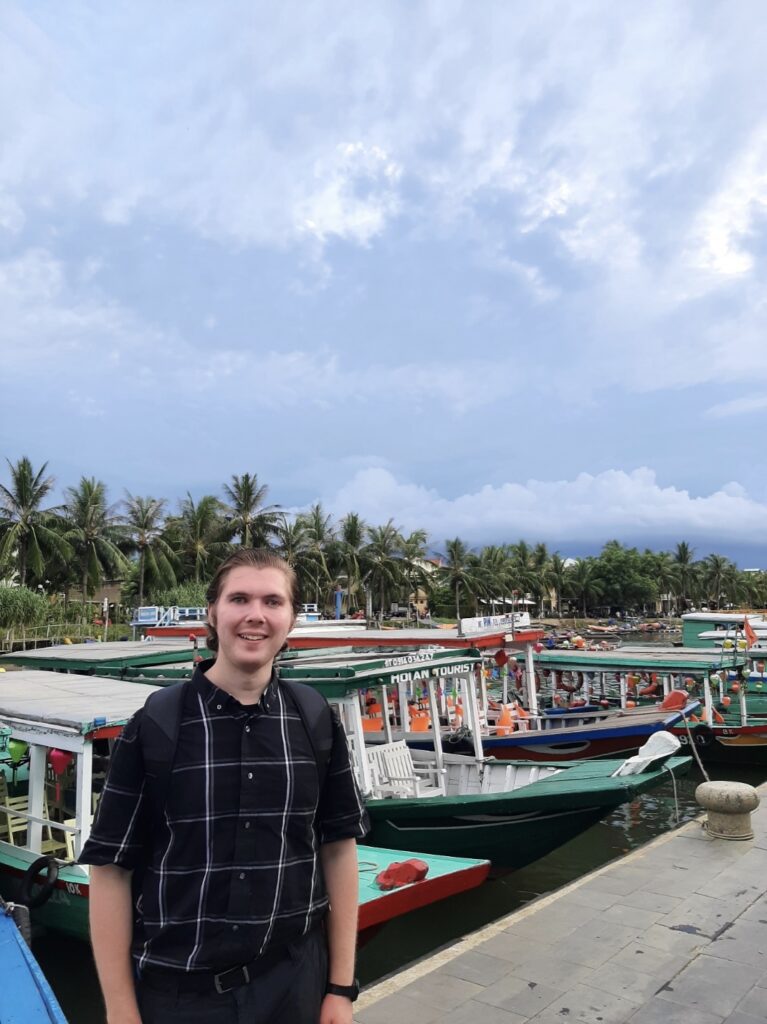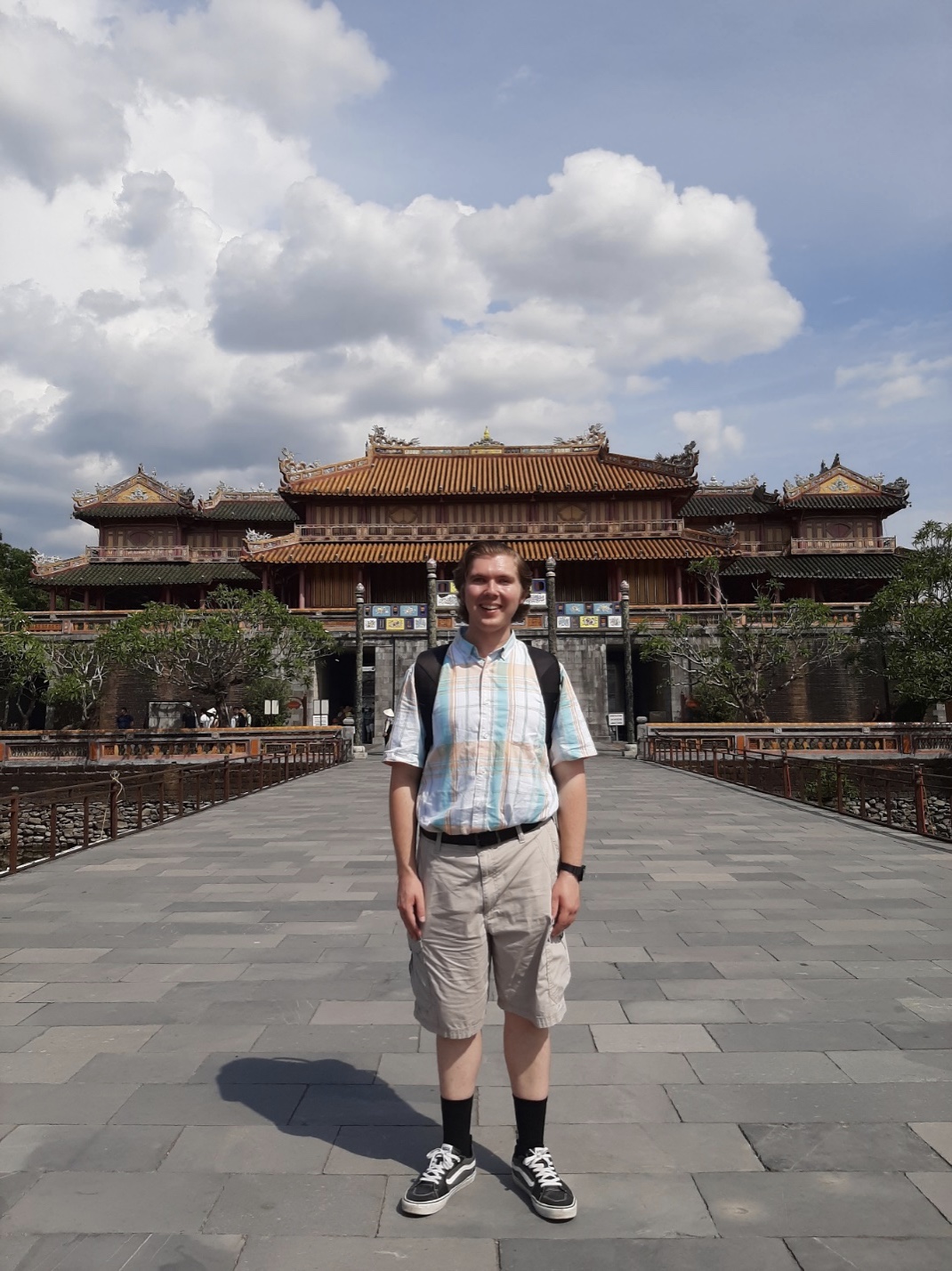Samuel Watson is triple majoring in chemical engineering, Asia Studies (Southeast Asia), and economics.
His honor thesis project is based in Vietnam and specifically looks into how relations in the country have normalized, asking how the country was able to reunify so effectively in just a generation or two after the Vietnam War.
He recently received the Foreign Languages and Area Studies Award, which helped him travel to Vietnam for research. He talks to SHPRS about his project and award.

Question: How did it feel winning the Foreign Languages and Area Studies award? What does an honor like this mean to you?
Answer: I was really excited to get the FLAS award. This is actually my second time receiving it. But yeah, it was a very, very exciting cause.
I was trying to figure out my plans for the summer and without the award, I wouldn’t have been able to have this cool experience of going to Vietnam, getting to practice more Vietnamese, and being able to do some more research. So it was very, very exciting to be able to get that.
Q. Can you share a little bit about your experience being in Vietnam? Who did you work with while in Vietnam researching your Honors Thesis?
A. An experience I had in Vietnam was very unique. I got to do a special program at the Vietnam National University through the University of Languages and International Studies. They created a one-on-one course for me. It was very quick-paced, because it was one-on-one and it was very helpful. It was just an amazing opportunity.
And then, as for working on my research, I did most of it on my own, but I was able to talk specifically with two of the professors that were working with me, Professor Chang and Professor Qi. And the two of them are able to help me find certain resources. Specifically, they were able to help me figure out how to get a membership to the National Library of Vietnam to be able to go research up over there, so that was very cool.
Q. How has SHPRS staff/faculty impacted your research?
A. My honors thesis director is Dr. Brock Ruggles. and he’s been very helpful in getting my research more focused, and then helping me to make my decisions a little bit sharper, as well as pointing me in the direction of a lot of relevant sources that are often using U.S. Universities specifically related to the Vietnam War are his specialty.
Q. If there is one area in your research about U.S. and Vietnam relations post-Vietnam War that you want everyone to know, what would that be?
A. One thing I could share about what I’ve learned about U.S.-Vietnam relations is that it’s really amazing how the two countries have come closer together, despite their storied history. And it’s actually something that’s extremely unique and very much a current event.
Q. What is the most interesting thing you have learned about your topic since studying it?
A. I’d say one of the most interesting things that I have learned is seeing how history is written differently from opposing sides. Obviously, whoever writes the history has a bit of bias on their own but specifically looking into, like Vietnam and the discussion of the war and the post-war period. You just get such varying views. When you have the ones from Vietnam, they use terms that are related to the term liberation. They called their Northern army the Northern Liberation Front when they took over when they got into Saigon, called it the Liberation of Saigon, whereas if your sources are from the American side, or even just from refugees, it’ll read a different way. They’ll call them the Northern Army, Vietcong, or they’ll say the fall of Saigon. So just seeing the differences in views, but then, learning how to read between those and find the bigger picture, is really unique and it’s very good to have both sides to see.
Q. Did you get funding for your trip to Vietnam and who granted it?
A. I had some of the funding, and then I had to pay for part of it, too., the way the FLAS fellowship works is they cover your tuition up to a certain amount, which, with my program, it covered the whole tuition and then they give you a stipend to help cover some of the costs of travel or living expenses, so that helped cover a part of it, but without the assistance, I wouldn’t have been able to do it at all, so it was very good.
Q. What advice do you have for students looking for similar experiences?
A. I have two main pieces of advice.
The first one is, to talk with your professors in either a foreign language or just a foreign study class. Often these professors will learn of unique opportunities that most other people don’t know about and they’ll help you figure those out. For me, specifically, my Vietnamese teacher, Professor An Sakach, helped me to figure out about the class last year, and then this year as well.
The second piece of advice is just to use the ASU scholarship portal or other means of finding scholarships. I think a lot of people don’t actually look for these things. Your odds are actually, I think, higher than you would think they would be otherwise.
Q. Is there anything else you’d like to add?
A. I’m just glad I had the opportunity to be able to share a little bit about this and hopefully, other people will find similar opportunities through ASU and be able to pursue their research opportunities and studies.


